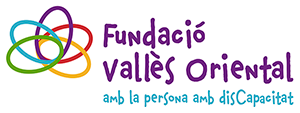Xavier Quincoces Employment Centre: Employment Inclusion Service (SOI)
The purpose of the Xavier Quincoces Employment Centre is for adults with learning difficulties to achieve full social integration in the community they belong to with the help of two services: the Occupational Therapy Service (STO) and the Employment Inclusion Service (SOI). These each have their own objectives and means of operation but they are closely related in terms of service management and organisation.
The SOI service is intended for people who need limited support – for a certain time in particular areas. It is aimed to promote and preserve personal and social capabilities through carrying out employment and adjustment activities.
Each SOI group has its own identity, making it different from the others. The groups operate independently, with supports adapted to the different profiles in accordance with People-Focused Planning (PFP) methodology, although the general cohesion of the service is maintained (common activities, etc.).
The Employment Centre’s general programme of activities is intended to allow independent operation by the Employment Inclusion Service (SOI). It offers specific personal and social adjustment activities and pre-employment activities depending on the person’s profile, preferences and interests, in accordance with People-Focused Planning and depending on the training of the supervisor.
As the operation is designed with the need for flexibility in mind, depending on the fluctuation of work, the hours will always be adapted, prioritising pre-employment work. The scheduled personal and social adjustment activities will be carried out when the situation allows. Personal and social adjustment means the set of activities aimed at the user, with their direct participation, intended to achieve their structural rehabilitation and an improvement in their relationship with their environment. The different scheduled activities are:
Academic-training-knowledge (different activities: calculation, geography, science, language, etc.) + interactive digital screen (Tuesdays)
Centres of interest (social skills, sexuality, health, professions, outings, etc.) + interactive digital screen (Wednesdays)
Crafts (themes, mosaic, carpentry…) (Thursday)
Sport (football, basketball, handball, volleyball, badminton, athletics, petanque, skittles, etc.) Sports court (Fridays)
Methodology
At the Occupational Centre we put planning focused on each person with learning difficulties at the centre of the way we work. This new system was agreed in 2013 and first implemented in 2014 in a project we call the “New Day Care Model”.
We encourage the conditions necessary for achieving improvements in all areas of a person’s welfare and quality of life with their active participation, based on respect for their dignity and rights, their interests and preferences. Every person benefiting from the service has a life and care plan designed as a tool for action. This is the result of conversations between the user, their family, the community around them and professionals from various services. Diversity and variety among service users is taken into account with flexible, multidisciplinary, personalised care adapted to the person, with services designed around their individual needs. Everyone’s personal schedule of weekly activities, based on their strengths or competencies, is drawn up with the help of all elements of the service.
Our work is not limited to looking after people’s needs. Instead we promote and facilitate projects to achieve the happiness of all of the people cared for at our centre. Their wishes and desires are the driving force for them to achieve a fulfilling life.
In each of the Occupational Centre’s services:
Resources are adapted to the new care structure in line with the New Day Care Model, adapted to the Occupational Centre, incorporating the necessary improvements and changes.
The tools and resources making self-management and self-determination easier for people with learning difficulties are adapted
A proposal for rehabilitation and training activities suited to the developing needs of the service users is planned
Spaces are created to allow them to express their needs, personal interests, hopes and desires
Facilities
The Occupational Centre occupies 2,700 m² on land belonging to the FVO arranged on a single floor with different levels to house the Occupational Centre services. The centre now has a functional, dynamic building with capacity to adapt to future generations of adults with learning difficulties who ask to use the service. For this reason, one of the open-plan units is reserved exclusively for the SOI.
There is also a psychomotricity room, an IT and communication room, a marquetry room, a library and computer room, a crafts room, a sick bay and a leisure room, as well as a garden and vegetable garden area, a multisports court and petanque rinks.
There is also a reception area, the Sílvia Ramada function room, the speech therapy, psychology and pedagogy office, and offices for the centre management, teachers and social workers.
History
The Xavier Quincoces Employment Centre began in 1991 with the assessment of the first seven users and in 1992 the adult EVO (Assessment and Guidance Team) assessed 41 more people as members of the centre. The main group of 48 users who formed part of the Employment Centre came from the same workshop, which, after the publication of the Decree in 1987, was reorganised in April 1992 to form the Valldoriolf Workshop Employment Centre (now called the Xavier Quincoces Employment Centre).
It was not until 1996, with the publication of Decree 336/1996, that the Employment Inclusion Service (SOI) was regulated. This was for adults with learning difficulties who were not members of the Employment Centre and could not be hired by the FVO Special Work Centre because of their problems. They went under the misnomer “transitionals” because, legally, they were in a transitional situation under the regulations that covered them. About 70 people joined the SOI to give the Employment Centre the two services it now has: the Occupational Therapy Service (STO) and the Employment Inclusion Service (SOI).
The renovation of the Occupational Centre’s facilities has made it possible to look after a wide range of adults with learning difficulties. The SOI currently has capacity for 70 registered users.


